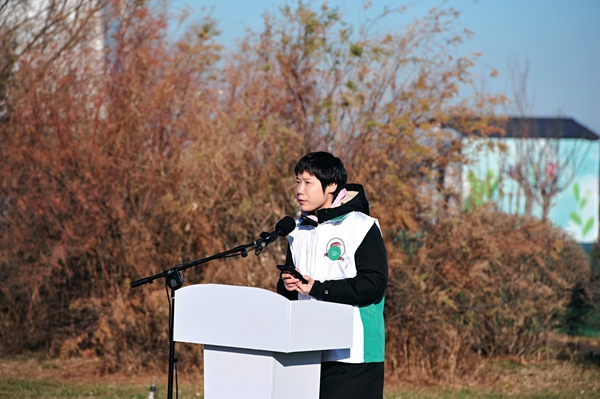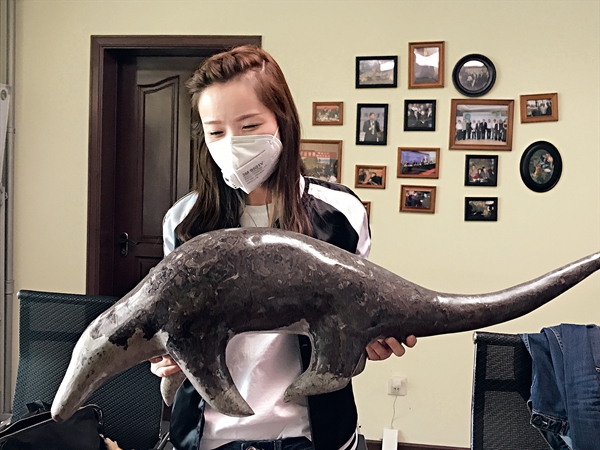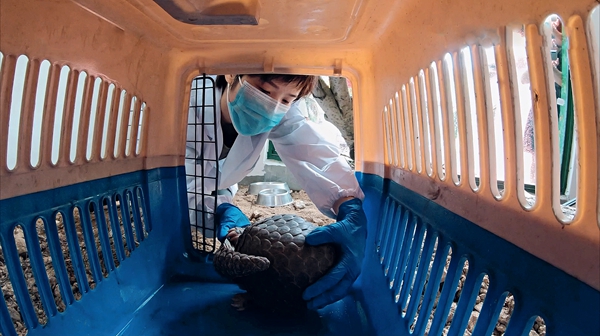Protecting Wetlands for Human-Nature Harmony

Zhang Siyuan, assistant secretary-general of China Biodiversity Conservation and Green Development Foundation (CBCGDF), and her colleagues have made unremitting efforts toward wetland protection and biodiversity conservation in recent years. They have achieved many positive results. In 2018, Zhang received the Public Figure of the Year Award during the China Charity Festival.
Zhang was born in Funan, a county in Fuyang, a city in East China's Anhui Province, in 1994. When she was young, she got close to nature. She played on the river bank, picked and ate strawberries in the fields, and she enjoyed the warm sunshine. Her childhood was carefree.
In 2012, then-18-year-old Zhang became a volunteer with CBCGDF. She was offered a full-time job at the foundation after she graduated from university.
Founded in 1985, CBCGDF was originally known as China Milu (Deer) Foundation. During the past 30-plus years, the foundation has been dedicated to biodiversity conservation and green-economic development. It is now one of the most influential foundations, in terms of biodiversity conservation and green development, in China.
Protecting Wetland Ecosystems
What's a wetland? Zhang explains it vividly: Referred to as a "Kidney of the Earth," a wetland plays a crucial role in helping preserve and filter natural water resources, while offering sanctuary to migrant birds and many other species. Wetlands can connect rivers and lakes. For example, the numerous wetlands within the Yangtze River basin regulate and preserve water resources during flood season. Wetlands are essentially interactive zones between aquatic and terrestrial ecosystems. Interactions between surface water and groundwater in wetlands play an essential role in purifying water and reducing environmental pollution.
"Many plants and animals depend on wetlands. Land animals drink water in wetlands. Even a small area of a wetland is home to many animals during the dry season. The reeds and other plants in and around the wetlands provide habitat for birds. Birds lay their eggs in the reeds. Insects live here and become food for the birds. In this way, a complete ecological chain, with wetlands as the core, is formed. Such a chain plays a role in protecting biodiversity and maintaining ecological environment," Zhang says.

How can wetland conservation and economic development be balanced? Zhang explains the concept of Biodiversity Conservation in Our Neighborhood (BCON), proposed by CBCGDF in 2021.
The BCON aims to determine the most suitable ways to conserve biodiversity effectively in areas with intense human activities, to balance biodiversity conservation and sustainable livelihood development, and to achieve harmonious coexistence between man and nature.
In March 2022, a photographer from CBCGDF shot a collection of photos about biodiversity conservation in artificial wetlands near Wuhan, a city in Central China's Hubei Province. At that time, the water levels of natural lakes tended to rise during the rainy season, so birds could not inhabit and forage in natural wetlands. They had to fly to nearby farmers' aquaculture ponds. The ponds lay fallow, and many aquatic plants grew, which was convenient for birds to inhabit and breed.
"Farmers agreed to cooperate with us to protect the birds. However, they live on raising fish and shrimp in the ponds. Production could not be suspended for long. Wetland conservation cannot be supported at the expense of farmers' livelihoods. So, the concept of BCON was applied to solve the problem," says Zhang.
"We guided the farmers, to let appropriate quantities of aquatic plants grow in their ponds, raise fish and shrimp in a scientific way, use natural and biological methods to control pests, and reduce the disturbance to birds. It not only protected the habitat and breeding grounds for birds, but also ensured farmers' incomes," Zhang continues.
Conserving Wildlife
Human activities in wetlands affect the wild animals and plants that depend on the wetlands. Human-wildlife conflicts exist. In recent years, Zhang and her colleagues have been committed to dealing with the relationship between humans and wildlife.
Since 2015, the foundation's Pangolin Working Group has made unremitting efforts toward protecting pangolins (small animals in Asia that eat insects, and have hard scales on their bodies), including fighting the illegal trade of pangolin products (pangolins are among the most trafficked mammal species globally), participating in the protection and confiscation of living pangolin, and trying to release pangolin in the wild.
"I touched living pangolins for the first time in 2017. They are naturally timid and shy. Although they are good at swimming, they have few escape skills. Pangolins are hunted because their scales can be used as medicine, and their meat is advertised as delicious. My colleagues and I have been engaged in wildlife protection and research, and we have achieved remarkable results. We hope to raise public awareness about the plight of endangered species, like the pangolin, and reduce demand for products derived from protected animals," Zhang says.

Zhang in 2018 participated in efforts to find Yangtze River Dolphin (widely known as Baiji dolphin) in Wuhu, a city in East China's Anhui Province. Since the Baiji dolphin was declared "functionally extinct" in the wild (which means there are too few members of a species in the wild to perform its function in the ecosystem) in 2007, it had been rarely seen for more than decade. Initiated by CBCGDF, volunteers, photographers and freshwater dolphin researchers participated in the activity.
Zhang and other participants observed the river's surface carefully every day during April 2018. They sighted a Baiji-dolphin lookalike on April 18. Fortunately, a photographer snapped a photo of that dolphin. Relevant experts and researchers finally confirmed it was a Baiji dolphin. The photo proved there likely were a few members of the species in the wild. As a result of that photo, the Baiji dolphin was still declared as "'functionally extinct' in the wild" on the Red List of Threatened Species, updated by the International Union for Conservation of Nature, in November 2018.
"At that time, I felt that my work was very meaningful," says Zhang.
She notes there are many people, like her, who are trying to guard the wetlands and wildlife, with their own practical actions, because they want to protect the harmony between humans and nature.
Photos Supplied by CBCGDF and Interviewee
(Women of China English Monthly February 2023 issue)
Please understand that womenofchina.cn,a non-profit, information-communication website, cannot reach every writer before using articles and images. For copyright issues, please contact us by emailing: website@womenofchina.cn. The articles published and opinions expressed on this website represent the opinions of writers and are not necessarily shared by womenofchina.cn.?

 京公綱安備 11010102004314號
京公綱安備 11010102004314號